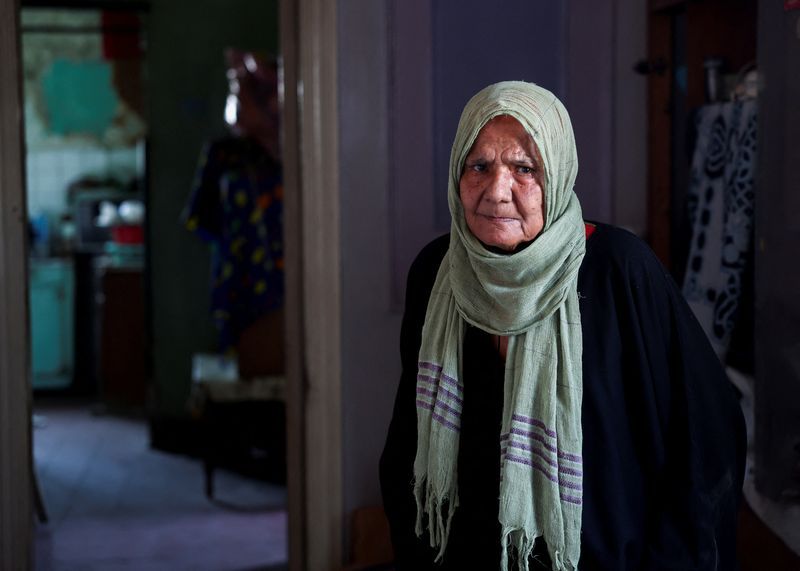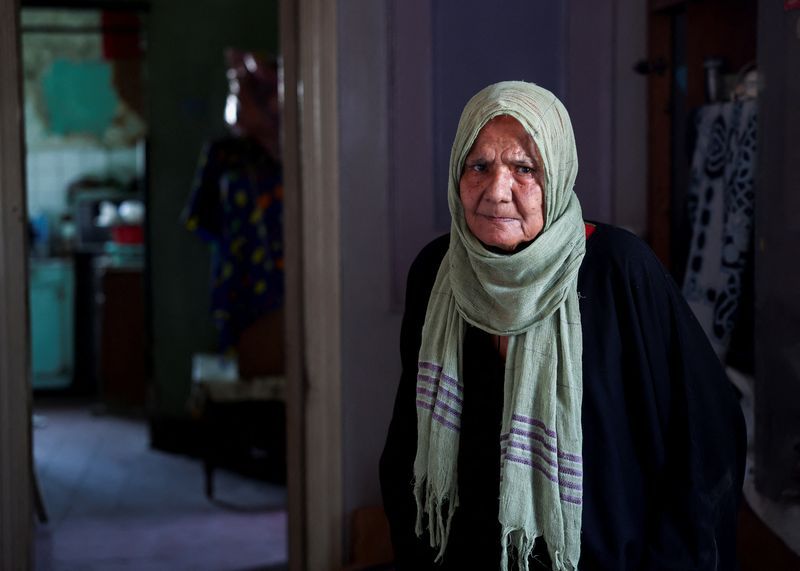
CAIRO (Reuters) -The rent on Khaddara Ibrahim Ali’s cramped apartment in downtown Cairo was just about the only expense she could count on staying stable as waves of soaring inflation and subsidy cuts ate away at her modest income.
Thanks to a decades-old rent cap, Ali, 84, pays just under 11 Egyptian pounds ($0.23) per month for the eighth-story home where she has lived for half a century, overlooking a patchwork of ageing buildings and narrow streets in the Azbakeya district.
But now even that is set to change. In July, Egypt’s parliament approved the country’s biggest rent overhaul in decades, scrapping rent caps and rules that had let tenants and their heirs stay in their homes indefinitely.
The change, which will take effect for non-residential units over five years and for homes over seven years, impacts millions of households and has raised fears among many tenants who had counted on their rents to ensure a degree of economic stability.
“I’m afraid all the time,” Ali said. “After all this familiarity, I would just leave?”
The law applies to “old rent” contracts signed before Jan. 31, 1996, when measures were taken to liberalise the rental market but not applied retroactively to units rented out before that.
Since then, Egypt has seen a huge divergence in rental prices, with tenants in protected units often paying the equivalent of just a few cents even in upscale and gentrified districts.
Supporters of the changes say they will bring long-awaited relief to landlords, who complain that rent caps have whittled their income to token amounts and stopped them from investing in maintenance.
SAFETY NET PLEDGE
“As a tenant, you think you became a pensioner, old and poor, and the landlord remained the same? Is this logic? Landlords and owners also include widowers, divorcees, and pensioners,” said Cairo landlord Tarek Mohammed, 61, who rents out two apartments for six Egyptian pounds a month each and a shop for two pounds a month.
Officials have also pledged to provide safety nets. On Aug. 27, Egypt’s cabinet approved rules for allocating state housing to old-rent tenants under rent, rent-to-own, and ownership schemes.
Mahmoud Fawzi, minister for parliamentary affairs, told a cabinet meeting in early August that the state had a “full and legal commitment” to make sure eligible tenants had suitable housing before the law went into effect and stressed that “there wouldn’t be any family without shelter.”
The measures were taken after a court ruling last November declared the old rent laws unconstitutional and ordered the government to resolve the situation. Some experts have questioned whether the plan was sufficiently studied in the haste to meet the court order.
“(The law) was rushed,” said May Qabeel, a researcher at the Egyptian Initiative for Personal Rights. “The data they relied on hasn’t been shared… We don’t know the exact numbers, details of tenants, or property holdings.”
During the transitional periods of five and seven years rents will risetwentyfold in “prime” areas and tenfold in “mid-tier” and “economic” zones. Minimum rents are set at 1,000 Egyptian pounds in prime districts, 400 pounds in mid-tier, and 250 pounds in poorer neighbourhoods. The rents will then be reviewed and readjusted by a government committee, thereafter rising 15% annually during the remainder of the transition.
For many, those prices are steep. Egypt’s state-set minimum wage is 7,000 pounds per month, though many private-sector workers earn less, and housing already consumes nearly a quarter of household spending, Qabeel said.
“(Spending on housing) will rise for everyone at a rate they can’t handle … amid constantly increasing prices, without compensation.”
PRESSURE ON HOUSING SUPPLY
Egypt’s housing supply is under heavy pressure. The country’s social housing programme has delivered about 69,000 units per year over the past decade, according to Finance Ministry figures.
In contrast, the Built Environment Observatory, a housing-focused think tank, estimates that nearly 530,000 families living in old rent apartments will need support. With long waitlists of applicants, the state will face a steep challenge in buildingand distributing homes quickly enough.
Even if enough housing is delivered, relocating could impose even more financial strains, since many new homes could be located on Cairo’s outskirts, farther from jobs and services, urban designer and researcher Ahmed Zaazaa said.
Zaazaa said a sudden influx of units for sale or rent could also destabilise prices and accelerate gentrification in historic areas. Commercial areas could be transformed, with small grocers and workshops replaced by franchises.
“If there are no safeguards, buildings may be demolished, new ones built under new rules, heights, and designs that erase historical or popular character,” he said.
For Mohammed Hassan, a 35-year-old shopkeeper in al-Khosos district, the law threatens not just his home but his livelihood as well.
“My life is destroyed,” he said. “I will leave my shop in five years and my house in seven years, where shall I go?”
(Reporting by Mariam Rizk and Mohamed Ezz, Editing by Alex Dziadosz, William Maclean)





